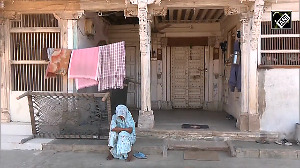
Last Sunday, Deputy Prime Minister L K Advani flew in an Indian Air Force helicopter from Bangalore to Tumkur in Karnataka to address an election meeting. By the time Advani had completed his speech, the Election Commission had announced the dates for the general election and enforced the Model Code of Conduct for parties and candidates.Advani was thus compelled to send the helicopter back and return to Bangalore by car.
Such is the power of the Model Code of Conduct. What political parties and their candidates do in the coming days will be watched closely by the Election Commission.
rediff.com presents a guide to the Model Code of Conduct:
What is the Model Code of Conduct?
It is a set of guidelines laid down by the Election Commission to govern the conduct of political parties and candidates in the run-up to an election.
What is the need for such a code of conduct?
It is intended to provide a level playing field for all political parties, to keep the campaign fair and healthy, avoid clashes and conflicts between parties, and ensure peace and order. Its main aim is to ensure that the ruling party, either at the Centre or in the states, does not misuse its official position to gain an unfair advantage in an election.
When does it come into force?
The Model Code of Conduct comes into force the moment an election is announced and remains in force till the results are declared.
In 2000, there was a tug of war between the central government and the Election Commission on the Model Code of Conduct.
The government went to the Supreme Court against the Commission's ruling that the code of conduct comes into force the moment elections are announced. The government insisted it should be enforced only from the date of formal notification of each phase of election.
The Election Commission called an all-party meeting to settle the row. Eventually all parties, including the ruling Bharatiya Janata Party, agreed unanimously to support its stand on the Model Code of Conduct.
To whom does the code of conduct apply?
It applies to all political parties, their candidates and polling agents, the government in power, and all government employees.
So what does the Model Code of Conduct mean for a ruling party?
Ministers, including Prime Minister Atal Bihari Vajpayee, cannot combine their official visits with electioneering work. They also cannot use official/government machinery or personnel for electioneering work. Public places for holding election rallies and helipads for flights in connection with elections are to be made available to all parties on the same terms and conditions on which they are used by the party in power.
Can ministries sanction grants out of the government's discretionary funds during election time?
No. Ministers and other authorities cannot sanction grants and payments out of discretionary funds from the moment the elections are announced.
Can the government run an advertising campaign in the mass media?
Advertisements at the cost of the public exchequer and misuse of official mass media like Doordarshan for partisan coverage during an election have to be scrupulously avoided.
In that case, what happens to the 'India Shining' campaign?
No more 'Indian Shining' ads can appear now. The campaign has been suspended.
What are the other guidelines for ministers and other government officials?
Ministers and other government authorities should not announce or promise any financial grants to the people; they should not lay foundation stones for or inaugurate any projects; they should not promise public facilities like roads; and they should not make any ad hoc government appointments.
How do candidates and parties campaign when the code of conduct is in force?
Parties can issue its manifesto detailing the programmes they wish to implement if elected to government, the strengths of their leaders, and the failures of parties and leaders opposing them. They can use slogans to popularise and identify parties and issues, and they can distribute pamphlets and posters to the electorate. They can hold rallies and meetings where candidates can persuade, cajole and enthuse supporters, and criticise opponents. Candidates can travel the length and breadth of the constituency to try to influence as many potential supporters as possible.
Can parties/candidates hold meetings wherever they want?
Yes, but the party or candidate has to inform the local police authorities of the venue and time of any proposed meeting well in advance to enable them to make necessary arrangements for controlling traffic and maintaining order.
Can parties call for votes on communal lines?
No. The Model Code of Conduct strictly prohibits parties and candidates from making any appeals to caste or communal feelings for securing votes. Mosques, churches, temples, and other places of worship also cannot be used for election propaganda. No party or candidate can indulge in any activity that may aggravate existing differences or create mutual hatred or cause tension among different castes, communities, religious or linguistic groups.
Can parties criticise their opponents?
Yes, but the criticism of other political parties should be confined to their policies and programmes, past record and work. Parties and candidates should refrain from criticism of all aspects of private life not connected with the public activities of the leaders or workers of other parties. Criticism of other parties or their workers based on unverified allegations or distortions should be avoided.
What happens if a candidate or party does not obey the Model Code of Conduct?
The Election Commission has warned that any breach will be dealt with sternly. The Commission has the power to disqualify a candidate if s/he refuses to follow the Model Code of Conduct.
Image: Uday Kuckian
IN THIS SERIES
What is an election symbol?
What is the Election Commission?
What does dissolution of Parliament mean?






 © 2025
© 2025